
Poor nutrition
As many as 50 percent of hospital patients worldwide aren’t adequately nourished or are at risk of malnutrition, according to a study in Medical Science Monitor. “This means that they aren’t getting the nutrients they need in the right amounts,” says Boston-based nutritionist Dana Greene, RD. If malnutrition goes on long enough, it can have a significant impact on a person’s health—including unexplained weight loss, she says. While older adults are at risk because of medications, natural appetite loss or food insecurity, a nutritionally imbalanced diet can contribute to malnutrition in younger, presumably healthy people. The best way to prevent malnutrition is to eat well-balanced meals with the right mix of protein, fat, and carbohydrates. Make sure you know the 42 strange symptoms that could signal a serious disease.

Muscle loss (sarcopenia)
Muscle loss tends to begin around age 40 and progresses more rapidly after the age of 75, according to the International Osteoporosis Foundation. “Most of us start to lose modest amounts of muscle mass after age 30, but this increases exponentially with age,” says Greene. While hormonal changes can contribute to how your body builds and stores muscle as you age, most cases of sarcopenia are linked to poor nutrition as well as inactivity. One of the best ways to prevent and treat muscle loss: Add more protein and vitamin D to your diet. “Older adults often require more protein to build the same amount of muscle, since the body becomes less efficient at processing protein,” Greene says. “Diets that are heavy in acid-producing foods such as meat and low in fruits and vegetables have been shown to have deleterious effects on muscle mass.” Adding weights to your workout routines also helps build muscle mass and strength.

Cancer
Unexplained weight loss is one of 15 symptoms of cancer that are too often ignored. There are several types of cancer, such as leukemia, lung, pancreatic, breast, and colon, that are known to lead to unexplained weight loss,” says Eyal Meiri, MD, Interim Chief of Medical Oncology at Cancer Treatment Centers of America in Atlanta. “There are many reasons that weight loss can occur with cancer,” he says. Some cancers cause a faster metabolism at rest, which burns more calories, while others may produce inflammatory proteins that can lead to weight loss and others may cause weight loss based on their location in the body. For example, “some cases of pancreatic cancer may occur where the stomach empties so you feel full quickly and some esophageal cancers may cause swallowing issues which prevent you from eating and causes weight loss,” he says. “If you have unexplained weight loss of more than 10 percent, something is going on,” he says. “Seek out your internist for an evaluation as there are many causes of unexplained weight loss that are unrelated to cancer.” Cancer treatments such as radiation and chemotherapy often cause a decrease in appetite, and it can lead to side effects, including nausea, vomiting, and mouth sores that discourage eating, he says.

Hyperthyroidism
Unexplained weight loss could be a sign of a thyroid disease such as Graves’ disease, an autoimmune disease that causes the thyroid gland to produce excessive amounts of the thyroid hormone. “Weight loss is usually one of a constellation of symptoms of Graves’ disease including heart palpitations, heat intolerance, hair loss, and insomnia,” says Caroline Korsten Messer, MD, endocrinologist, Lenox Hill Hospital in New York City. Graves’ disease is one cause of hyperthyroidism, but there are others that can also cause weight loss, she says. “A simple blood test can detect hyperthyroidism,” she says. The good news is that these conditions are all treatable. “Whatever the cause of your hyperthyroidism, there is a treatment that can help reverse the symptoms,” she says. Check out these 13 thyroid facts everyone should know.
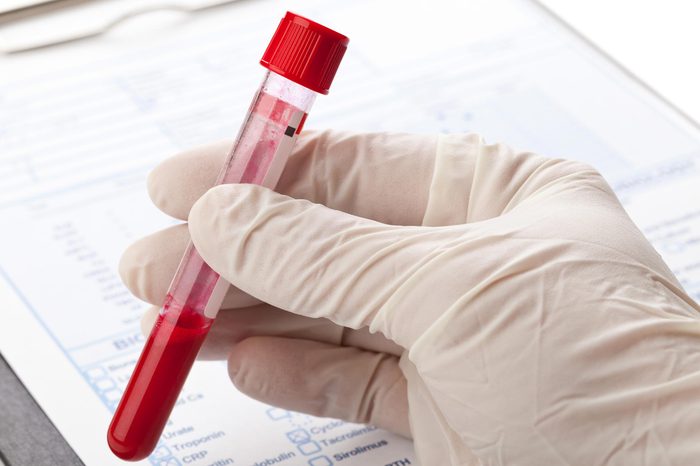
HIV and AIDS
Acquired immunodeficiency syndrome, also known as AIDS, is a chronic, potentially life-threatening disease that’s caused by the human immunodeficiency virus (HIV). “HIV can make it harder for your body to absorb nutrients, which causes malnutrition and can lead to a decreased appetite,” says Lisa Ashe, DO, an internist in Washington, DC. HIV/AIDS can also increase the risk of opportunistic infections that cause weight loss either through a decreased appetite or because it’s painful to eat. . While there’s no cure for HIV or AIDS, there are medications that can dramatically slow the progression of the disease, decrease the risk of infections, and allow you to live an otherwise healthy life.

Peptic ulcer disease
Unexplained weight loss is one of 10 signs of an ulcer you should never ignore.”Peptic ulcers are open sores that develop on the inside lining of the stomach as well as on the upper portion of the small intestine. Because the main symptom of peptic ulcers is stomach pain, they often cause decreased appetite,” says Dr. Ashe. Peptic ulcers can also make you feel full. Lifestyle modifications in combination with different medications are the best way to treat the condition and any weight loss associated with it.

Depression
Depression can manifest itself in different ways including weight loss. This is one of the 17 things psychologists wish people knew about depression. “Unfortunately, one of the many side effects of this debilitating disease is loss of appetite, which naturally causes a person to lose weight,” says Dr. Ashe. While there’s no one single cause of depression, many cases can be treated effectively with medication and therapy—although some antidepressants can also contribute to further weight loss.
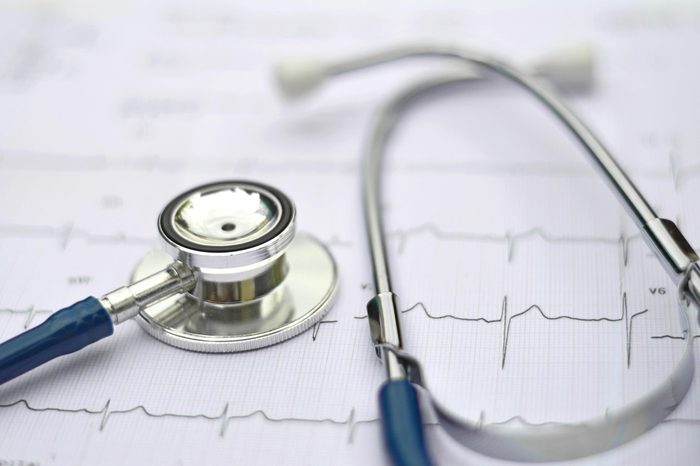
Congestive heart failure
About 6.2 million adults in the United States have heart failure, according to the Centers for Disease Control and Prevention. Heart failure occurs when the heart is unable to pump enough blood and oxygen to the heart and the rest of the body, and an important indicator of this condition can be rapid unexplained weight loss, known as cardiac cachexia ora: It’s a loss of at least 7.5 percent of normal weight within six months, according to Mount Sinai Medical Center in New York City. Make sure you know these 10 signs of congestive heart failure.

Diabetes
Type 2 diabetes is often associated with weight gain or obesity, but weight loss may be a surprising diabetes symptom. When the body is not using the hormone insulin properly, glucose no longer makes its way into the bloodstream to be used as energy. “When there is an insufficiency in insulin, the body starts burning fat and muscle for energy, causing a reduction in overall body weight,” explains Dr. Ashe. Diabetes is diagnosed through simple blood testing. See your doctor if you are concerned. Preventing type 2 diabetes is still your best bet, and these 10 proven eating habits can help you do just that, according to new science. (Type 1 diabetes is an autoimmune condition that can’t be prevented.)

Alcoholism
Alcohol might be loaded with calories and cause bloating, but being an alcoholic can also cause a person to lose dramatic amounts of weight. “This tends to happen because there’s an increased fullness and early satiety that comes along with drinking to the point of excess,” says Dr. Ashe. “Additionally, alcoholism can lead to peptic ulcer disease, which also causes weight loss.” People with alcoholism are also often malnourished because they trade well-balanced meals in favor of alcohol. Don’t miss these 15 silent signs your body might be in trouble.
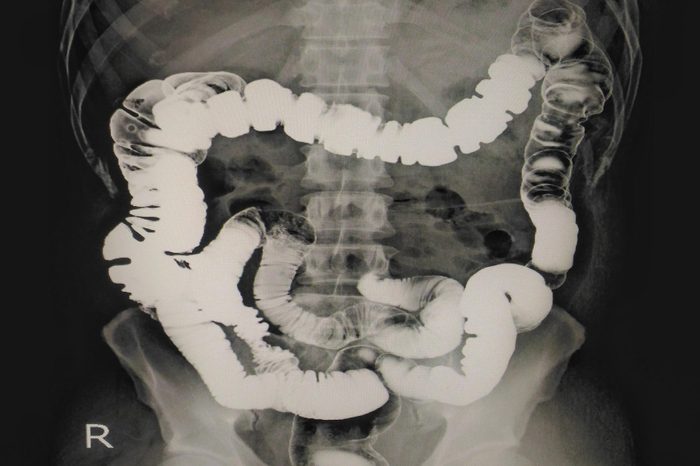
Celiac disease
Celiac disease is an autoimmune disorder aggravated by chronic exposure to gluten that causes damage to the small intestine. Gluten is a protein in wheat and other grains. “When celiac is at its worst, it destroys the lining of the intestine, which causes people to stop absorbing nutrients and, over time, stop absorbing calories as well,” says Niket Sonpal, MD, assistant professor of clinical medicine at Touro College of Osteopathic Medicine in Harlem, NY. And this leads to weight loss, he explains. Watch for these additional symptoms of celiac disease.

Parasites
Tapeworms, roundworms, hookworms—thousands of people pick up these and other parasites each year, usually after ingesting contaminated food or water while traveling abroad or right here in the United States. The parasites busy themselves absorbing nutrients in the body and reproducing. Decreased appetite and weight loss can result, but the parasites’ human hosts may not realize it because they picked up the bugs so long ago. “Parasites can take weeks and months, sometimes years, to reveal themselves,” says Dr. Sonpal. Eventually, nausea, vomiting, and diarrhea set in, and these can also contribute to weight loss. Check out these 8 silent signs you could have a parasite.
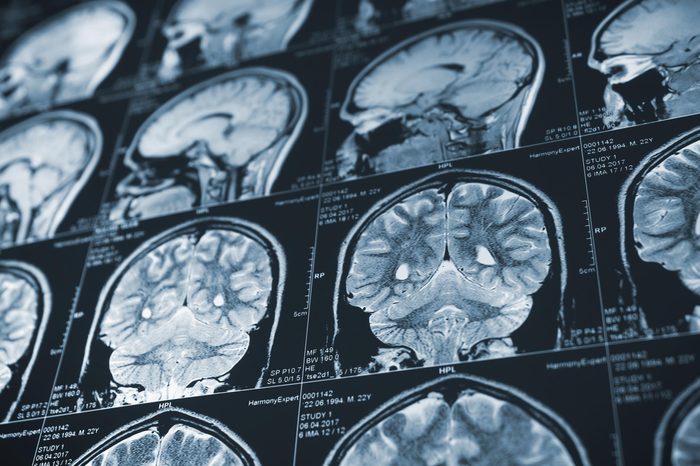
Dementia
It makes sense that people in the advanced stages of Alzheimer’s disease and other forms of dementia often lose weight—they may be unable to communicate their food needs. But other factors contribute too. Those with dementia can become socially isolated or simply forget to eat regularly. “The breakdown of neurons in the brain dulls the senses of taste and smell, so food becomes less appealing,” says Dr. Sonpal. In fact, older people who experience significant weight loss could be raising their risk of developing dementia, according to a 2019 study in BMJ Open. Check out these 16 hidden signs you’re not as healthy as you think.

Crohn’s disease
Malnutrition and weight loss are common in people with Crohn’s disease, a chronic inflammatory condition of the gastrointestinal tract. As with celiac disease, their bodies don’t absorb nutrients properly and they’ll begin to eat less because food can trigger intestinal distress and other symptoms. In addition, people with Crohn’s disease may have ulcerations throughout their body, including the mouth and stomach. “This causes pain when eating and a subsequent aversion to food,” says Dr. Sonpal. Unexpected weight loss isn’t the only Crohn’s disease symptom you may be ignoring.
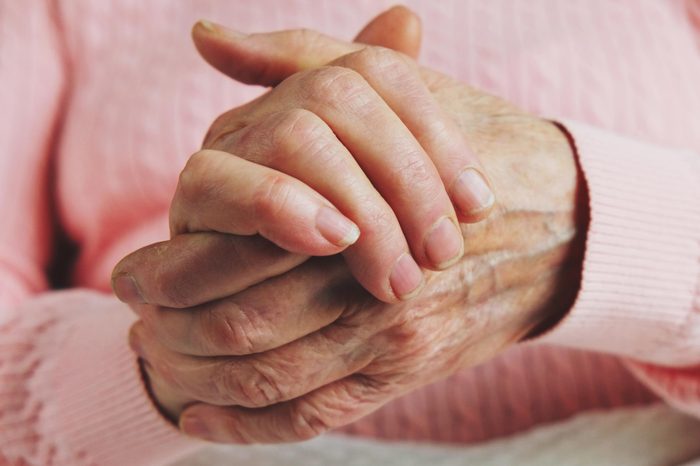
Rheumatoid arthritis
Most people think of rheumatoid arthritis (RA) as a chronic condition that causes painful, stiff, and swollen joints. But RA can also cause unintended weight loss. The disease spurs inflammation, which leads to an overproduction of a group of proteins called cytokines and an increase in the resting metabolic rate. “So the body burns more calories and fat, and patients end up losing weight without meaning to,” says Dr. Sonpal.

Lupus
Lupus is an autoimmune disease like RA, but it wreaks havoc throughout the body—from kidney damage to GI disruption to rashes. “So many organ systems are affected that people do end up experiencing weight loss,” says Dr. Sonpal. Lupus can also cause acid reflux; sufferers will feel burning pain in the chest area, often after eating—which in turn causes some patients to avoid food. The gastrointestinal problems that often accompany lupus—including stomach cramps and diarrhea—can also lead to weight loss, as can the medications used to treat it. Don’t miss these 15 symptoms of lupus you should never ignore.

Addison’s disease
When a person has Addison’s disease, the adrenal glands are damaged and don’t produce the stress hormone cortisol in sufficient quantities. “If you get stressed out, your body struggles in the absence of enough cortisol [and] instead of experiencing the normal stress response, you get sick with nausea, dizziness, and lightheadedness,” Dr. Sonpal says. “You burn calories and muscle mass and you lose weight.” People with Addison’s can also have weight loss and other symptoms like nausea in the absence of stress. One telltale sign of the disease, in addition to gastrointestinal upset, is hyperpigmentation of the skin, which appears as “bronzing” on such areas as the knees and elbows. This is one of the surprising diseases that dermatologists find first.

Zinc deficiency
The body needs numerous vitamins and minerals, including zinc, to operate at its best. Most people in the US get enough zinc through food, but—for those who don’t—a deficiency can cause a decrease in appetite and weight loss, according to the National Institutes of Health (NIH). “Zinc deficiency causes a constant bad taste in your mouth, which leads to not eating and losing weight,” explains Dr. Sonpal. Good sources of zinc include oysters, red meat, poultry, beans, and nuts. Zinc deficiency can occur as a result of taking certain medications, including some antibiotics, and certain diuretics prescribed for high blood pressure. Vegetarians are also at risk for zinc deficiency as meat is a good source of zinc, the NIH states. Read about the 8 clear signs you’re on a bad diet.

Sjogren’s disease
The two most common symptoms of Sjogren’s syndrome are dry eye and a dry mouth, according to the Mayo Clinic. “The salivary glands become destroyed, and people have trouble eating and swallowing,” says Dr. Sonpal. Despite having good oral hygiene, people with this disease may have numerous cavities and even lose their teeth, according to the National Institute of Dental and Craniofacial Research.
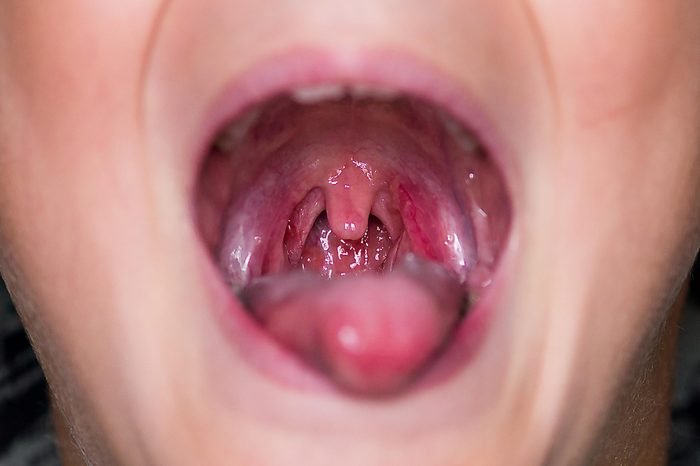
Achalasia
This disorder damages the esophagus, the tube that connects the back of your throat to your stomach. “The nerves at the end of the esophagus are supposed to relax when you eat food so the food can go into your stomach,” explains Dr. Sonpal. “But in people with achalasia, the nerves die-off and food can’t get into the stomach.” (In fact, achalasia is Latin for “failure to relax.”) The result: extreme pressure in the chest that causes people to become averse to eating. “Over time, this gets worse and worse, and people develop significant weight loss,” he says. Now check out these 15 signs that weight gain means your health is in trouble.

